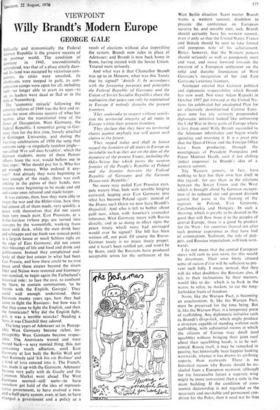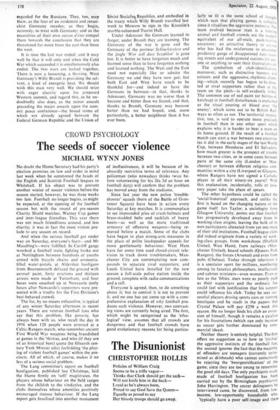VIEWPOINT
Willy Brandt's Modern Europe
GEORGE GALE
Politically and economically the Federal German Republic is the greatest success of the postwar world. The condition of
Germany in 1945, unconditionally surrendered, was that of a place utterly dam-
ned. Its land was occupied by victorious con- querors, its cities were smashed, its inhabitants were steeped in guilt, its con-
centration camps were open for all, including itself—no longer able to avert its eyes—to see, its leaders were dead or fled or in the dock at Nuremberg.
The 'economic miracle' following the currency reform of 1949 was the first and re- mains the most obvious success of what has
become, after the transitional time of the Zones of Occupation, West Germany, the
Federal Republic. I remember going to Ger-
many then for the first time, loosely attached to Gottingen University, and during the Fasching celebrations of 1950 the song that everyone sang—a singularly tasteless jingle— was called 'Wer soil class bezahlen', which the German students, many of them Panzer officers from the war, would bellow out in their cups: 'Who should pay for it, Who has got enough money, Who ordered it any- I‘ay?' And already they were beginning to have enough of the ready, there was cash tinkling in the palms of their hands, new fortunes were beginning to be made and old and vaster ones refound and made larger. It was curious, then, how they were able to forget the war and the Hitler-time, how they had almost all of them made, very quickly, a peace with themselves that did not cause them very much pain. East Prussians, at a Schlachterfest (where pigs are turned into sausages by the womenfolk, working from dawn until dusk, while the men drink beer and schnapps and eat fresh raw minced pork) in a largish house or small Schloss right on the edge of East Germany, did not count their blessings of life and food and drink and guiltlessness. Instead they complained end- lessly of their lost estates in what had been East Prussia, and how there could be no true peace until -these estates beyond the rivers Oder and Neisse were restored and Germany was reunited, to begin again the Fatherland's historical role: to face the east, to confront the Slays, to contain communism, `to be friends with the English, Georgie'. They could well enough understand, these Germans twenty years ago, how they had come to fight the Russians: but how was it that they came to fight the English, and then the Americans? Why did the English fight, ach, it was a terrible mistake! Needing a hero, it was Churchill they adored.
The long years of Adenauer set in. Percep- tibly West Germany became richer, im- perceptibly West Germans became respec- table. The Americans wooed and were wooed back—a sexy monied thing, this, not containing much affection, until East Germany at last built the Berlin Wall and then Kennedy said 'Ich bin ein Berliner' and a kind of love entered into it. The French, too, made it up with the Germans. Adenauer became very pally with de Gaulle and the Common Market went ahead. The West Germans seemed—still seem—to have somehow got hold of the idea of represen- tative 'government, to have evolved a two- and-a-half-PartY system, even, at last, to have changed a government and a policy as a
result of elections without also imperilling the system. Brandt now rules in place of Adenauer; and Brandt is now back home in Bonn, having treated with the Soviet Union. Treated most seriously.
And what was it that Chancellor Brandt was up to in Moscow, what was this Treaty that he signed? 'Article 3: In accordance with the foregoing purposes and principles the Federal Republic of Germany and the Union of Soviet Socialist Republics share the realisation that peace can only he maintained
in Europe if nobody disturbs the present frontiers.
'They undertake to respect without restric- tion the territorial integrity of all states in Europe within their present frontiers.
'They declare that they hare no territorial claims against anybody nor will assert such claims in the future.
'They regard today and shall in future regard the frontiers of all states in Europe as inviolable such as they are on the date of the signature of the present Treaty, including the Oder-Neisse line which forms the western frontier of the People's Republic of Poland and the frontier between the Federal Republic of Germany and the German Democratic Republic.'
No more may exiled East Prussian eyes. pale watery blue, look with sensible longing eastward, leaping over East Germany into what has become Poland again: instead of the Drang nach Osten we now have Brandt's Ostpolitik. And who is left to bother about guilt now, when, with America's avuncular tolerance, West Germany treats with Russia directly. and in so doing in effect signs the peace treaty which none had envisaged would ever be signed? The bill has been written off, not paid. Of course the Russo- German treaty is no peace treaty proper, and it hasn't been ratified yet, and won't be by Bonn, until the Russians have produced acceptable terms for the settlement of the
West Berlin situation. Scant matter. Brandt wants a western summit, doubtless to precede the conference on European security he, and sensible men, seek. Brandt should certainly have his western summit, even if only so that the United States, France and Britain should be seen to take formal and pompous note of his achievement.
Better, however, that the Western powers should seriously as well as pompously meet and treat, and move forward towards the creation of a European settlement on the solid and durable foundation of West Germany's recognition of her and East Germany's existing frontiers.
Adenauer created that German political and diplomatic respectability which Brandt has now used. Not since Adam Rapacki in October 1957 put forward at the United Na- tions his celebrated but unadopted Plan for an effectively demilitarised Central Euro-
pean zone has any seriously propounded diplomatic initiative looked-like unfreezing
the Cold War in those parts of Europe where it first froze until Willy Brandt succeeded to the Adenauer inheritance and began wisely spending and investing it. It is a great pity that the Quai d'Orsay and the Foreign Office have been producing, through the mouthpieces of President Pompidou and Prime Minister Heath, cool if not chilling 'initial responses' to Brandt's idea of a western summit.
VI Western powers, in fact, have nothing to fear but their own fear itself in this regard: for any thaw in the relations between the Soviet Union and the West which is brought about by German recogni- tion of its reduced size and present division cannot but assist in the thawing of the regimes in Poland, East Germany, Czechoslovakia and Hungary. In such a thawing, which is greatly to be desired in the good that will flow from it to the peoples of central Europe, there is a good by-product for the West: for countries thawed out after such postwar experience as they have had of communism, Stalinism, the rule of pup- pets, and Russian imperialism, will look west- wards.
I do not mean that the central European states will rush to join NATO, for this would be disastrous. Their own finely attuned sense of raison d'etat will be sufficient to pre- vent such folly. I mean, instead, that they will do what doubtless the Russians also, if left to their inclinations by their masters, would like to do: which is to bask in the warm, to relax, to slacken, to cat the long- forbidden fruits of freedom.
Ns-ro, like the Warsaw Pact, is becoming an anachronism. It, like the Warsaw Pact, must be preserved for the time being. But it, like the Warsaw Pact, is a temporary piece of scaffolding, Any diplomatic initiative such as Brandt's Osipplitik, which might produce a structure capable of standing without such scaffolding, with substantial rooms in which the citizens of Europe -may dwell (and squabble) without bringing their joint roof about their squabbling heads, is to be wel- comed. Russia itself, it may be remarked in passing, has historically been happier looking westwards, whence it has drawn its civilising aspects, than eastwards. There is no historical reason why Russia should be ex- cluded from a European mansion, although for the foreseeable future a separate wing might be more convenient than a suite in the main building. If the condition of com- munist dictatorship is not regarded as the necessary and inevitable and permanent con- dition for the Poles, then it need not be thus regarded for the Russians. They, too, may thaw, as the fear of an irridentist and revan- chist Germany recedes; as they begin, seriously, to treat with Germany; and as the necessities of their own raison d'etat compel them towards the conclusion that they are threatened far more from the east than from the west.
It is time the last war ended; and it may well be that it will only end when the Cold War which succeeded it is simultaneously also ended. The two wars are locked together. There is now a loosening, a thawing. West Germany's Willy Brandt is providing the sol- vent, a kind of energetic heat. We should wish this man very well. We should seize with eager alacrity upon his proposed Western summit, and regard this, as he un- doubtedly also does, as the minor assault preceding the major assault upon the sum- mit peace conference—the broad terms of which are already agreed between the Federal German Republic and the Union of Sdviet Socialisb Republics, and embodied in the treaty whidh Willy Brandt travelled last week to Moscow to sign in the Kremlin's marble-columned Tsarist Hall.
Under Adenauer the Germans learned to forget; under Brandt they are learning. The Germany of the war is gone and the Germany of the postwar Schlachterfest and the jingle 'Wer soil doss bezahlen' is gone too. It is better to have forgotten much and learned some than to have forgotten nothing and learned nothing. The West and the East need not especially like or admire the Germany we and they have now got; but both East and West have much to be thankful for—and indeed so have the Germans in between—in that, thanks to Adenauer, Germany was no worse than it became and better than we feared, and that, thanks to Brandt, Germany may become better than we had hoped, and, more particularly, a better neighbour than it has ever been.































 Previous page
Previous page